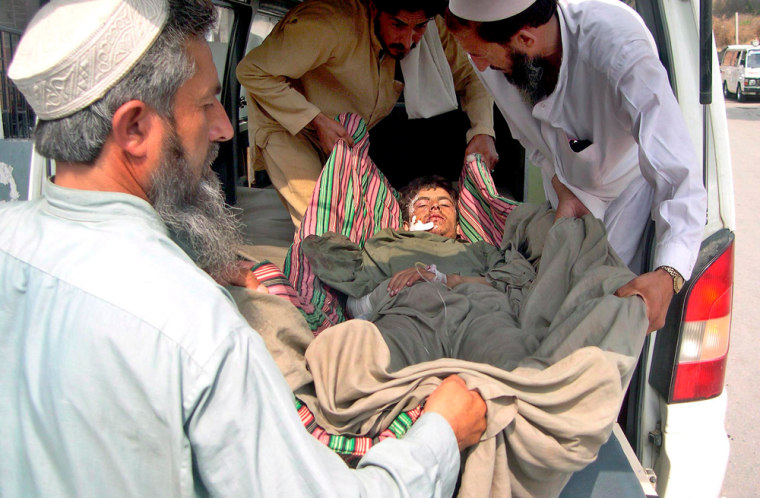Pakistan's army and the U.S. military gave widely differing accounts Wednesday of a clash on the Afghan border that left 11 Pakistani troops dead.
Pakistan called the airstrikes "cowardly."
While their forces were just a few hundred yards apart, a huge gulf existed in their views of events — underscoring the mutual suspicion between two uneasy allies in the war against international terrorism.
The alliance is unpopular among Pakistanis, whose newly elected civilian government is negotiating with some militants in hopes of curbing a surge in violence. Western officials fear peace deals could give more space for Taliban and al-Qaida militants to operate.
There was no way to independently check on what happened in the fighting Tuesday night on the ill-defined border between Pakistan's Mohmand tribal agency and Afghanistan's Kunar province.
It is difficult for journalists to reach the area, communications are poor, and the different players in the lawless region seem prone to give their own spin — not least the Taliban militants against whom both the U.S. and Pakistan are supposed to be teaming.
A dozen bombs launched
U.S. officials said three aircraft launched about a dozen bombs against insurgents attacking into Afghanistan from Pakistan.
The Pentagon said it was too early to say whether the airstrike killed the Pakistani troops, as claimed by Pakistan's army, although the U.S. Embassy in Islamabad expressed regret over the deaths.
American officials defended the air attack, saying the U.S.-led coalition in Afghanistan was retaliating after its troops came under fire about 200 yards inside Afghan territory.
The coalition said it had informed Pakistan's army the troops were being attacked from a wooded area near the Pakistani border checkpoint at Gorparai — where the Pakistani troops were killed.
The implication of that account appeared to be that the Pakistani troops were near the insurgents who were attacking coalition forces inside Afghanistan. Buttressing that view, the Taliban said eight of their fighters also died.
But Pakistan's army spokesman, Maj. Gen. Athar Abbas, rejected the claim that insurgents attacked from inside Pakistan or from the direction of the Pakistani border post. He also denied the U.S. military gave prior notice before it opened fire.
Abbas described a very different series of events.
He said the fighting broke out after Afghan government soldiers who had occupied a mountaintop position in a disputed border zone Monday acceded to a Pakistan request to withdraw.
"They were on their way back and they were attacked by insurgents in their own territory," Abbas said.
Pakistani army condemns airstrike
He said the Afghans then called in the coalition airstrikes, which he said hit the Pakistani Frontier Corps post across the border.
One of the few things the U.S. and Pakistani accounts appeared to agree on was that coalition troops did not cross onto Pakistan soil, although Abbas said coalition helicopters might have intruded into Pakistani airspace.
A Pakistani army statement condemned the airstrike as a "completely unprovoked and cowardly act" that could undermine cooperation in the war against terrorist groups.
The U.S.-Pakistani alliance was forged in late 2001 after Pakistan's government dropped its support for Afghanistan's Taliban regime before it was ousted by a U.S.-led invasion for hosting Osama bin Laden and al-Qaida fighters following the Sept. 11 attacks on America.
But the new Afghan government, and to a lesser extent Western nations, suspect Taliban fighters are given sanctuary across the border even though Pakistan has deployed 100,000 soldiers in its rugged tribal regions and lost hundreds of troops in fighting with Islamic militants.
Lending weight to that suspicion, Taliban militants based on the Pakistan side of the frontier claimed their own role in Tuesday night's battle and admitted suffering eight dead.
Maulvi Umar, a spokesman for an umbrella group of Pakistani Taliban, said between 60 and 100 of its fighters attacked NATO and Afghan troops who had set up bunkers and tents on what he called Pakistani soil. He claimed the Taliban fighters killed up to 40 Afghan soldiers, captured several more and shot down a NATO helicopter.
Abbas said he could not comment on the account from Taliban militants — which few dispute are often prone to exaggeration and embellishment in describing clashes.
"I can only give you my version according to what our security officers on the ground say," Abbas said.
